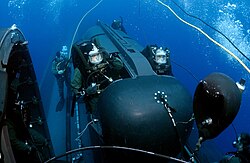SEAL Delivery Vehicle


The SEAL Delivery Vehicle or (SDV) is a manned submersible and a type of Swimmer Delivery Vehicle or diver propulsion vehicle used to deliver United States Navy SEALs and their equipment for special operations missions and is also operated by the Royal Navy's Special Boat Service who operates 3 SDV's.
The SDV is used primarily for covert or clandestine missions to denied access areas (either held by hostile forces or where military activity would draw notice and objection).
It should not be confused with the larger, dry submersible called the Advanced SEAL Delivery System (ASDS). The SDV is flooded, and the swimmers ride exposed to the water, breathing from the vehicle's compressed air supply or using their own SCUBA gear. (The ASDS is dry inside, with a full life support and air conditioning system.)
History
The SDV program dates back to World War II. Initiated by the Office of Strategic Services Maritime Unit (OSS MU). A “submersible canoe” was invented by the Italians during World War I . The idea was successfully applied by the Italian navy (Regia Marina) also early in World War II. The official Italian name for their craft was Siluro a Lenta Corsa (SLC or "Slow-running torpedo"). The vehicle was then copied by the British when they discovered the Italian operations and called it the “Sleeping Beauty”. It was employed by OSS MU during extensive training and exercises, but was never actually deployed for combat operations. The same capability was adopted by the post-war Underwater Demolition Teams (UDTs) in 1947. The one-man submersible displayed little functional military potential; however, it substantiated and characterized the need for improved and expanded UDT capabilities.[1] After the war, development continued in a garage-shop fashion by various UDT units, and included various "Marks" as the MK V, VI, VII, and XII. Intermediate numbers were assigned to some vehicles that never made it off the shop floor. All were of flooded design.[2]
The wet vehicle SDV program (officially named the Swimmer Delivery Vehicle, sometimes erroneously designated as the SEAL Delivery Vehicle after the Swimmer Delivery Vehicle Teams were renamed SEAL Delivery Vehicle Teams) currently centers on the MK VIII MOD 1, was first established in 1975 for use among UDT/SEAL teams. The early MK8 MOD 0 SDVs had a PRC104 UHF ultra high frequency radio for use underway. The newer model MK8 MOD1 has a dual sliding canopy and quick release hatch.[2]
Design
SDVs carry a pilot, co-pilot, and combat swimmer team and their equipment to and from maritime mission objectives on land or at sea. The pilot and co-pilot are often a part of the fighting team. The SDV has compressed air to extend the range of a swimmer's own air tank or rebreather. The SDV is silver zinc battery powered and equipped with propulsion, navigation, communication, and life-support equipment. The Mk 8 Mod 1 SDV can deliver several fully equipped SEALs to the mission area, be "parked" or loiter in the area, retrieve the SEALs, and return home. SDVs are generally launched from a Dry Deck Shelter on the back of a submarine, or from amphibious carriers (surface craft) equipped to launch and recover the SDV. It can also be airdropped (unmanned) into an operational area from a C-130 Hercules.[3]
Mark 8 SDV
The Mark 8 Mod 1 SDV is currently the only SDV employed by US military and Royal Navy, and it is an upgrade of earlier Mark 8 Mod 0 SDV. The primary improvement of Mod 1 over Mod 0 is that the former is constructed of aluminium alloy while the latter is built of glass fiber reinforced plastic. Mod 1 also incorporated advanced electronics. In addition to surface ship and submarine, other platforms the Mk 8 SDV can be deployed from include CH-47 Chinook & CH-53E Super Stallion helicopters. Specifications:[4]
Other operational vehicles included the now retired MK 6, MK 7, and the Mk 11. The Special Boat Service of the United Kingdom Special Forces operates three Mk8 Mod 1 vehicles.[5]
Operators
See also
References
- ^ https://navysealmuseum.com/home-to-artifacts-from-the-secret-world-of-naval-special-warfare/seal-delivery-vehicles-sdv-manned-submersibles-for-special-operations/
- ^ a b Introduction to Naval Special Warfare
- ^ Seal Delivery Vehicle
- ^ Jane's Fighting Ships. 2010.
{{cite journal}}: Missing or empty|title=(help) - ^ Jim Dorschner (27 May 2009). "Special Delivery". Jane's Defence Weekly. 46 (21): 28.
